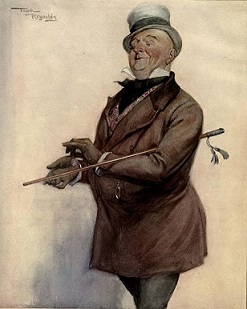
Courtesy of Frank Reynolds via wikipedia.com
In David Copperfield, Wilkins Micawber reveals the secret to financial happiness: Annual income twenty pounds, annual expenditure nineteen [pounds], twenty [shillings]’and six [pence], result happiness. Annual income twenty pounds, annual expenditure twenty pounds ought and six, result misery.
Such a simple formula. Live according to your means or be dogged with debt. Unfortunately, Micawber is silent about how to live without income. During the current Covid-19 crisis, some people facing that difficulty are dabbling in the stock market. That’s always a risky business but made more so for reasons I explained in an earlier blog. Private equity firms are providing liquidity to companies who formerly relied on their share price. That shift makes it difficult for the small investor to know the value of some companies. Not knowing offers nothing but surprises. Good or bad? Who can say?
Despite this blind spot, the Labor Department has decided to allow private equity funds to be included in 401k retirement plans. Claims abound that these funds yield higher returns than the Standard & Poors’ index, and so they are growing in popularity—even though some firms admit profits have fallen over the past few years. (“The siren call of private equity riches,” by Brett Arends, excerpted from MarketWatch.com, The Week, June 26, 2020, pg. 34.). Writer Brett Arends explains one reason for the drop off:
In the private equity’s glory days, firms could buy “cheap unleveraged companies with borrowed money during a time of falling interest rates.” Today “you will be buying expensive, leveraged companies with borrowed money, at a time when interest rates can’t fall much farther.” (Ibid, pg. 34.)
Of course, the same forces are at work everywhere a person looks to make money. Bank interest is razor-thin so there’s little to be gained by parking money in a savings account, except as a safe haven. Older people on fixed incomes face a dismal landscape. One government study found that within 5 years from retirement, many seniors run out of enough money to maintain their lifestyles. (“What the Experts Say,” The Week, June 26, 202, pg 33.) Those with defined pensions fared better than those without, of course. But pensions are fast disappearing, so future retirees won’t have that security.
What does a person do while Covid-19 plays havoc with our economy? Gambling on the stock market doesn’t seem like a safe bet. Micawber ‘s advice may be the sound one. Already, I’ve decided to give up my car. The pennies, pounds, or pences I save will go into my bank account, for I suspect the worst is yet to come.
